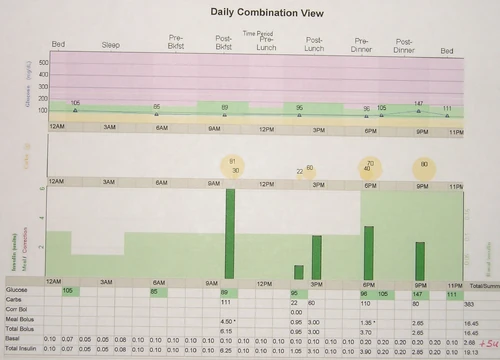What is "Expert Control?"[]

When the basal rate profile and meal bolus ratios are accurately established, an insulin pump can be extremely effective in controlling the blood sugar level, even under flexible situations such as a late breakfast, second helpings at lunch, and bolus on bolus snacking. However even for an expert, consistent success is difficult without more help from a continuous glucose monitoring system and an expert algorithm to utilize that data to the fullest.
Managing diabetes with insulin is a tricky business. A custom approach to implement intensive insulin therapy for each diabetic person is derived with the goal of finding balance between the best possible control of blood sugar levels and an agreeable lifestyle for that individual. Once accomplished, a system is established of testing blood glucose levels, measuring carbohydrates, bolusing insulin, anticipating physical activities, covering basal insulin needs, and maintaining a logbook of it all. Many decisions are needed each day which must take into account blood glucose data trends and past experience observed in the logbook. Given a population of diabetic persons, it seems there is a wide range of abilities and effectiveness in achieving "good control" from novice to expert. Even among experts, consistency is a surmountable challenge. For our purposes here, expert control will be defined as the delivery of insulin from an insulin pump that an expert has set up specifically after reviewing recent trends in performance of the regimen and tuning the pump parameters to maximize performance of the pump therapy.
The practice now is for diabetic persons to receive the training for intensive insulinotherapy as necessary to adjust their own insulin regimen, thus giving them the choice to live a dynamic lifestyle. Patients with diabetes see their endocrinologists or diabetes care team 4 times a year. In the old days, an insulin plan and a coordinated meal plan was given to the patients, and they were evaluated at the next office visit to see if the plan required an update. For example patients who were hungry were given more food in their diet plan and the insulin plan was adjusted to match. If an office visit were to show that blood sugars were consistently high, then the insulin regimen was tailored to address the issue. Now in modern times, a patient is taught to measure the carbohydrates in a meal they wish to eat, then calculate the insulin dose needed to cover that meal, increase or decrease the dose to compensate for high or low blood sugars, and then inject the appropriate dose of insulin. The patients are further taught to evaluate trends in their insulin response and tailor their basal insulin delivery and their insulin to carbohydrate ratio. The flexibility is highly valued, and is a cornerstone in insulin pump therapy. The insulin pump delivers only rapid acting insulin, which is used both for the basal insulin need at a low continuous rate, and also to bolus as needed at mealtimes. This gives the pump user the flexibility to turn down the pump to react to impending low blood sugar, or else in anticipation of less insulin need due to intensive physical activities. The point is: the insulin pump can deliver quantities of insulin with fine precision, but the ability to predict the actual insulin need in dynamic circumstances is difficult. Often a correction to the dose is still needed even when the estimate of insulin required was reasonably good and the delivery of the corresponding measured bolus of insulin perfect.
In terms of insulin delivery, expert control will be defined as:
- continuous evaluation of blood glucose levels and trends as well as prediction of BG levels in the immediate future, including diagnostics on the sensor and sensor data;
- automatically adjusting the immediate basal rate (i.e. a temporary basal rate) when BG levels or trends predict high or low blood sugar levels;
- automatically adjusting the long term basal rate prediction by evaluating trends in their actual performance to hold BG levels acceptably steady:
- automatically adjusting the BG level following a food bolus to correct immediate errors due to poor predictions of the insulin needed (usually due to faulty carb counting but may also be due to poor carbohydrate-to-insulin ratios);
- automatically adjusting the carbohydrate-to-insulin factors to improve future food boluses;
- automatically adjusting the blood sugar levels following a correction bolus when the predicted correction was in error;
- and automatically adjusting the insulin sensitivity factor to improve future predicted correction boluses.
The term expert control will also be used to contrast specifically with the "other" approach in mainstream research of the artificial pancreas, where we see plans for generic control by a PID controller. Not that a PID controller is a bad thing -- on the contrary it is a fantastic general purpose tool that is capable of controlling most anything. There are off-the-shelf PID controllers out there in industry successfully controlling such industrial systems as sewage processing, power generation, and manufacturing plants. There are new applications with PID loops built into modern digital electronics, giving a modern feel to the old approach. It would be natural for a medical researcher limited in experience with control theory to study the use of a PID controller in the closed-loop control of the insulin pump with feedback of blood glucose data from a continuous blood glucose monitoring system. In contrast to this general approach, systems engineers with a background in modern control systems suggest developing a customized control application specifically for an artificial pancreas by combining the expertise in making diabetes decisions from some of our best certified diabetes educators and caregivers and then implementing that expertise in a modern feedback control system to maximize performance synonymously with user friendliness.
Simply put, expert control is a concept of emulating the decision making of an expert diabetes caregiver and applying it in the control of the insulin pump as part of an artificial pancreas closed-loop system.